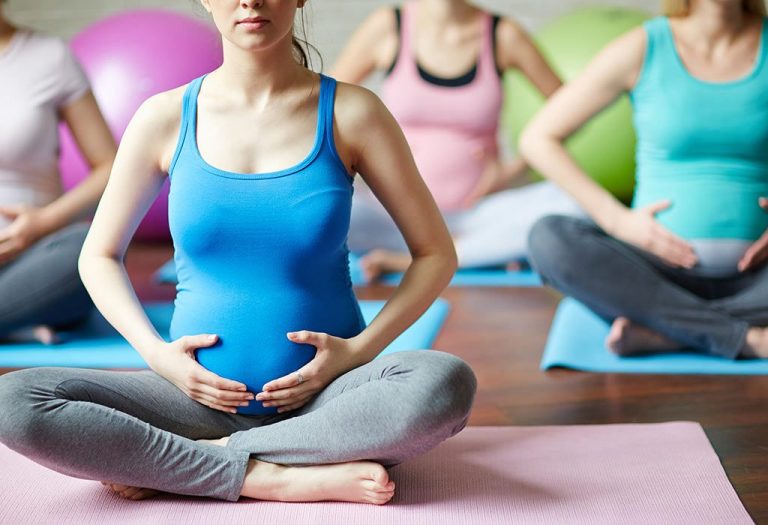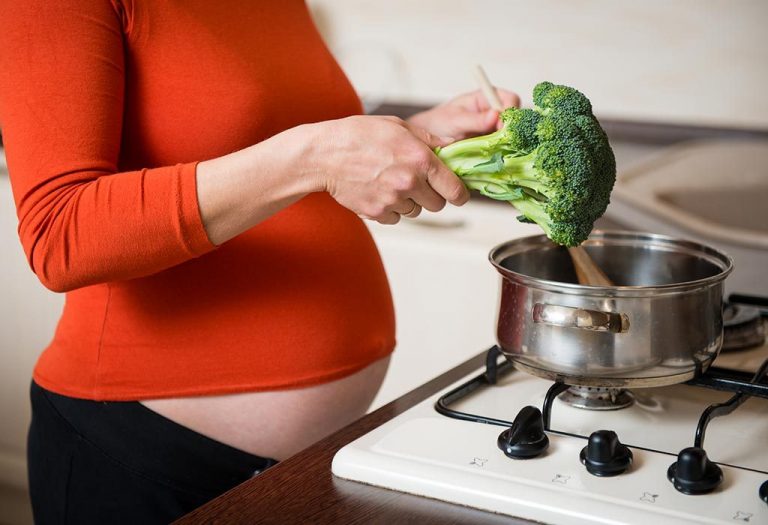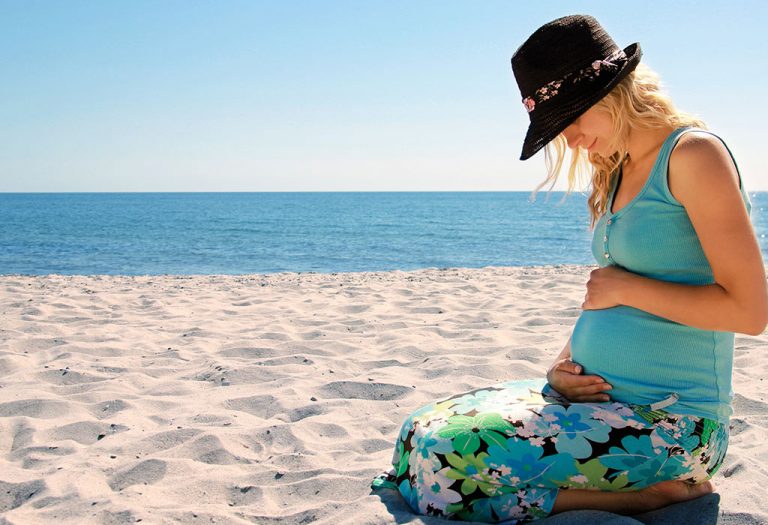8 Yoga Poses to Avoid When Pregnant

The importance of exercising cannot be undermined during pregnancy, and yoga is one of the safest ways of staying physically and mentally fit during the term. Yoga not only helps you prepare your body for the upcoming labour and birth, but it also helps in keeping you calm and relaxed. However, pregnancy requires a certain amount of physical restriction; therefore, you must not do all the yoga poses. While there are some poses that benefit a pregnant woman, there are some yoga exercises to avoid during pregnancy. If a doctor suggests some yoga poses not to do in pregnancy, then it is wise to follow the advice to ensure safety for both the mother and the child. In this article, we shall discuss various yoga poses that you should avoid during your pregnancy. But first, let’s understand why it is necessary to avoid them.
Why Should You Avoid Some Yoga Poses During Pregnancy?
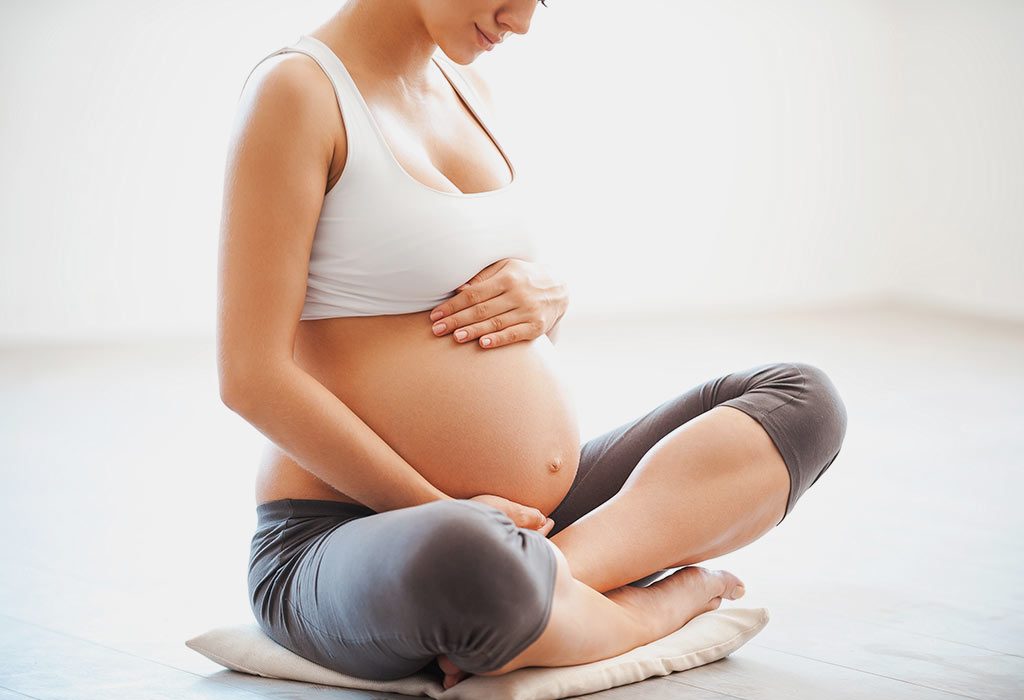
Your body is changing physically, and it does not remain the same during pregnancy. Therefore, your exercise routine also needs to be tweaked accordingly. The yoga poses you were doing prior to getting pregnant could pose a threat to you and your baby; they could be uncomfortable and difficult to do, and they could cause complications in different phases of pregnancy. For instance, in the first trimester, you should avoid deep abdominal twisting poses as it may adversely affect the implantation process. Hence, it is important to list down all the yoga poses to avoid while pregnant.
Types of Yoga Poses That Must Be Avoided During Pregnancy
Your body is working hard during pregnancy, and thus, it is not the time to push yourself to an extreme limit. The aim of yoga during pregnancy is to increase flexibility, relieve stress and work on your breathing. It is advised that you should practise yoga only as much as you can and if you feel like stopping or resting in between, listen to the signals of your body and take a break.
It is strictly recommended that you should consult your doctor before practising any kind of yoga poses during pregnancy. Go through our recommendations for yoga poses to avoid during pregnancy so you can cover these as well when you next consult your medical practitioner.
The following yoga poses are a complete no-no during pregnancy (1):
1. Jumping or Fast-Flowing Poses
Jumping and fast-flowing poses can put your body under loads of stress during pregnancy.

Why You Should Avoid Them
At the onset of your pregnancy journey, there’s a lot going on inside your body. It begins with conception when the implantation process begins, and then the development process of the embryo. In your early pregnancy, too much jumping and fast poses may make you more nauseous. Tommy’s.org suggests that it is best to avoid yoga poses that involve intense jumping and moving sequences (2). Restorative and grounding poses are beneficial during this time as they would not only help in the foetal development but also keep various complications arising during this time at bay.
Poses to Avoid
Avoid all yoga poses which involve fast movements and jumping.
2. Compressing or Twisting Poses
Twisting, twirling or compressing poses can put undue stress on your abdominal region during pregnancy.
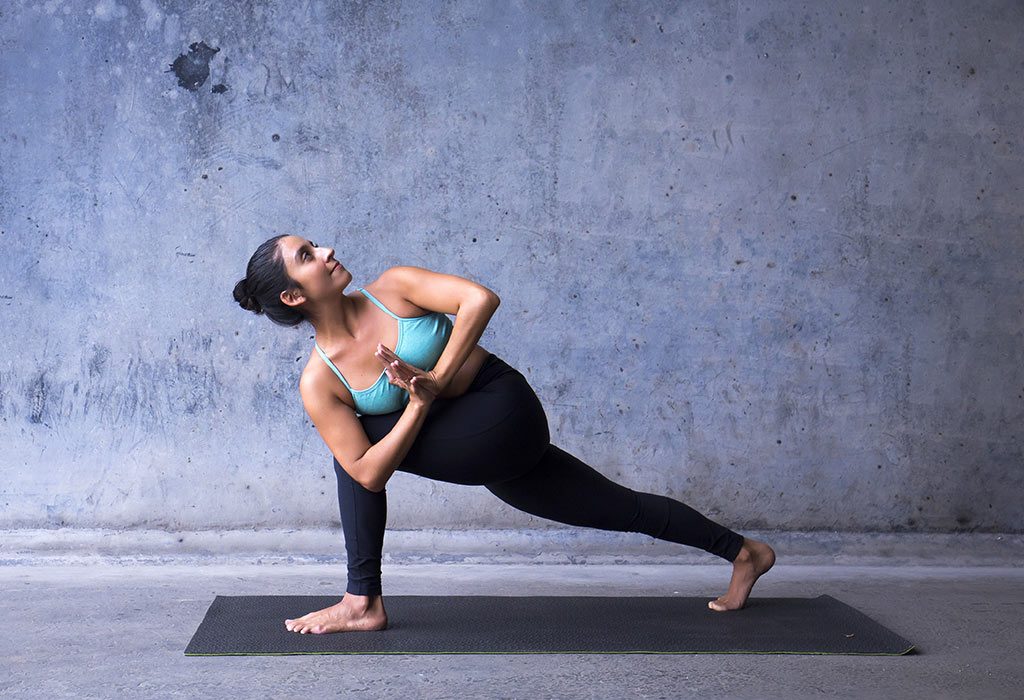
Why You Should Avoid Them
You will have to monitor your abdominal movements and refrain from doing any strenuous abdominal yoga poses. As the embryo attaches itself to the uterine wall, the formation of the placenta begins, and thus, you will have to monitor your tummy movements. Any twisting movements can decrease the flow of blood to your abdominal region due to compression.
Poses to Avoid
Avoid all the asanas that need twisting and compressing of the abdominal muscles, such as the Moon Pose, Boat Pose, Spinal Twist towards the knees, etc.
3. Vigorous Stretching Poses
It is important to pay heed to severe stretching poses as they may cause harm to your joints and ligaments.

Why You Should Avoid Them
As you move forward in your pregnancy, your body starts preparing for the labour and childbirth. This leads to your muscles and ligaments becoming more loose anf flexible than before due to pregnancy hormones. A relaxin pregnancy hormone is at its peak in the first trimester, which helps muscles, ligaments, and tendons stretch to accommodate the growing baby (3). Extreme stretching during your first, second, or third trimester could end up hurting your ligaments or pelvic joints.
Poses to Avoid
Avoid all the yoga poses that need extreme stretching of the body, such as the Camel Pose, Fish Posture, Wheel Posture, etc.
4. Lying Back Poses
Though these poses appear less complicated, any yoga pose that involves lying on the back could put pressure on the inferior vena cava.
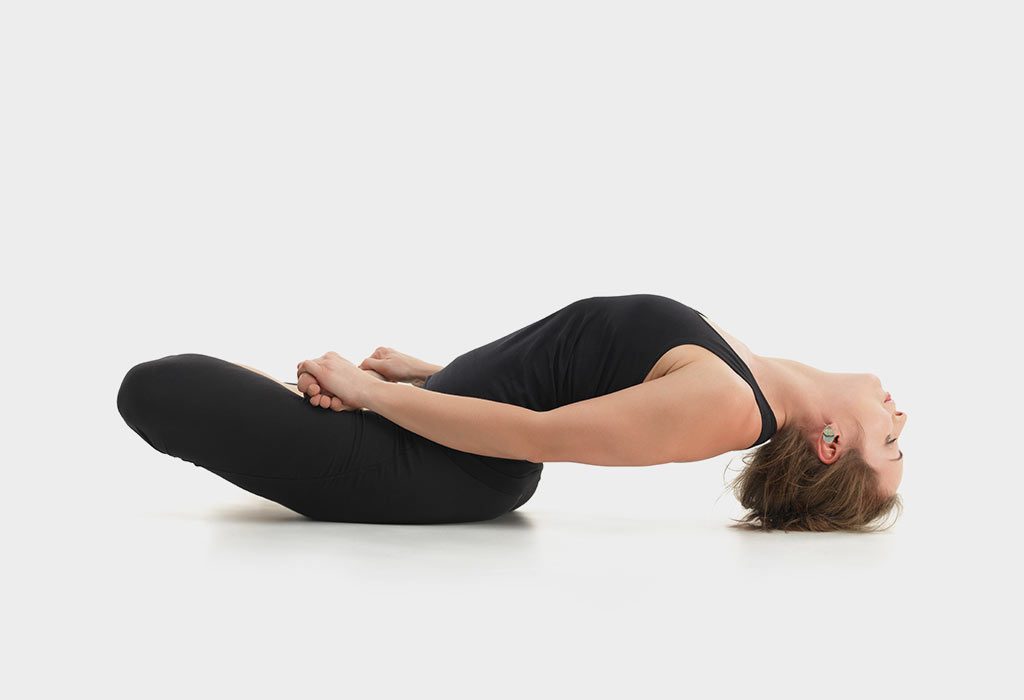
Why You Should Avoid Them
Lying on your back in pregnancy could trigger the feeling of nausea, cause lower back pain, increase the blood pressure and also cause heartburns. Apart from this, lying for longer durations on your back could harm the vessel called vena cava and cause various complications. Vena cava transfers deoxygenated blood from the lower part of the body back to the heart.
Poses to Avoid
Avoid poses that require lying on the back such as the Corpse Pose, Lying Down Body Twist, Boat Pose, Fish Pose, Bridge Pose, Plough Pose, etc.
5. Inversion Poses
Inversion poses can make you extremely nauseous and giddy during pregnancy.
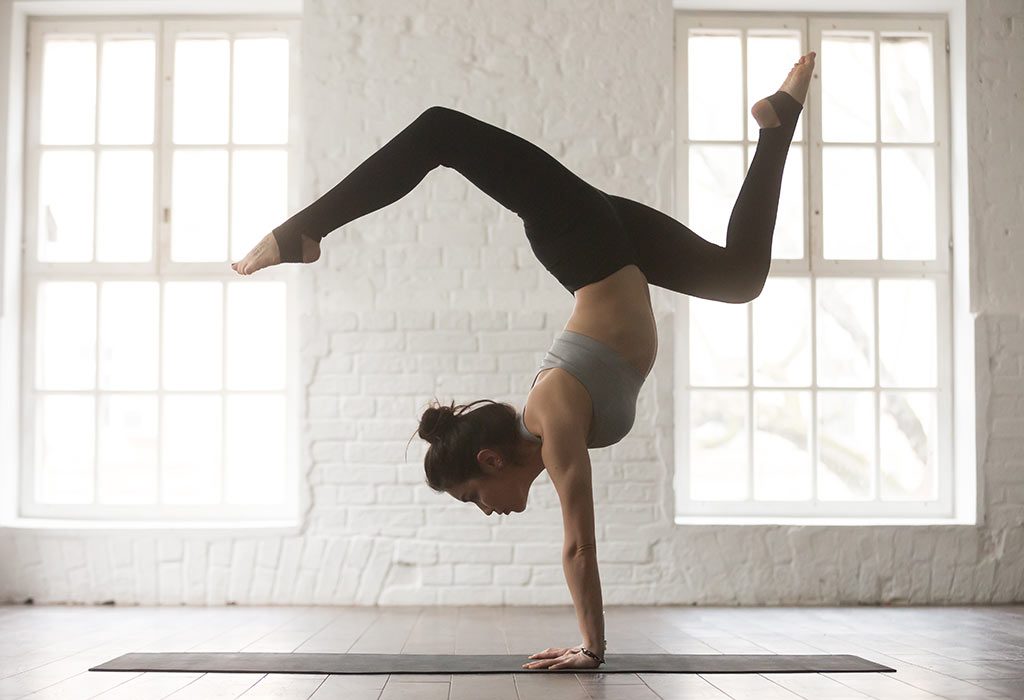
Why You Should Avoid Them
Women gain a substantial amount of weight to meet the pregnancy needs of the unborn child. As your tummy grows, it will become difficult for you to maintain your centre of gravity, and it is possible for you to lose your body’s balance. Doing inversion poses in the second or third trimester of your pregnancy may cause extreme dizziness and loss of balance, which could be fatal for you and your unborn child.
Poses to Avoid
Avoid poses that need inversions, like the Shoulderstand, Handstand, Wheel Pose, Plough Pose, Headstand, Downward Facing Dog Pose, etc.
6. Heated Yoga Poses
According to the Canadian Family Physician, heated yoga poses can cause an increase in body heat, potentially overheating and dehydrating the body , which could harm the unborn baby (4).
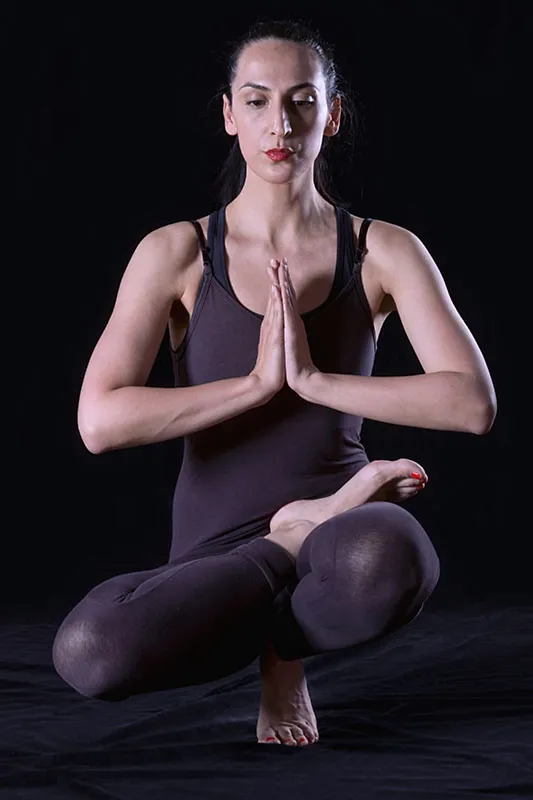
Why You Should Avoid Them
Some yoga poses are said to increase body heat. Therefore, it is important to know how each yoga pose affects our bodies. The poses that raise body heat should be completely avoided in all the trimesters as they can also cause dehydration during pregnancy.
Poses to Avoid
Kapalbhati (Breath of Fire Pose), Headstand, Bikram Pose, Warrior Pose, Plank Pose, etc. are some yoga poses that help to raise the body heat. Such yoga poses need to be avoided during pregnancy.
7. Prone or Belly Down Poses
As you move ahead in your pregnancy journey, you will find it difficult to lie on your tummy, and therefore, any yoga poses involving lying or bending down from the tummy may be harmful.
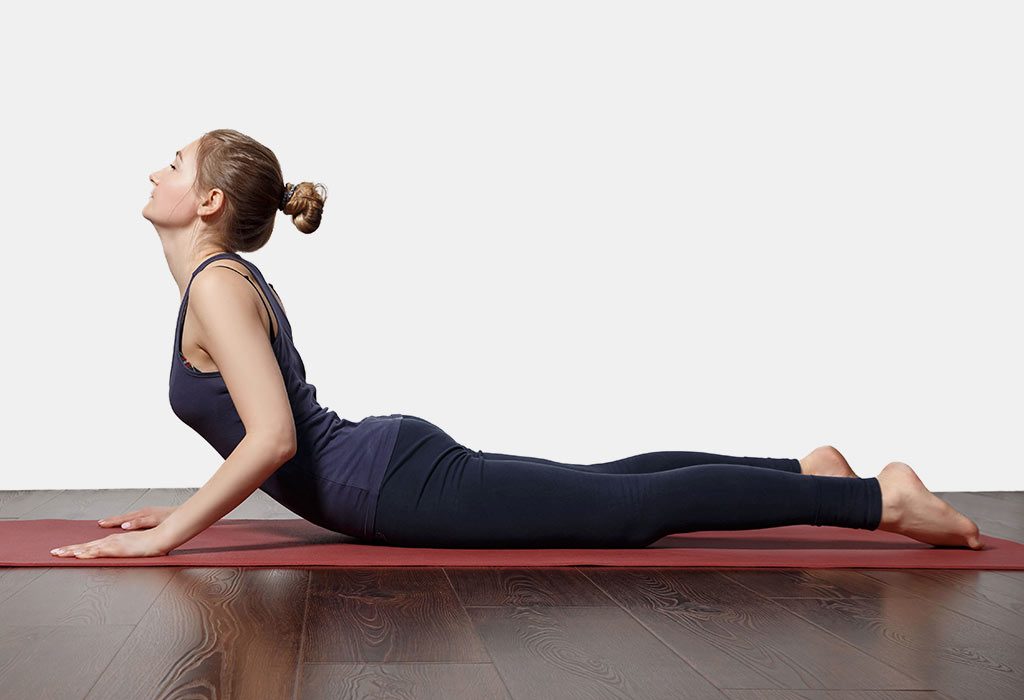
Why You Should Avoid Them
As your baby grows inside your tummy, it tends to squeeze your internal organs. Any kind of extra pressure on your abdominal region could be harmful to you and the baby growing inside you. Therefore, avoid all poses that require bending down from the tummy or lying on your tummy.
Poses to Avoid
Poses, such as the Swan Pose, Cobra Pose, Bow Pose, Locust Pose, Seated Forward Bend, etc., should be avoided completely during pregnancy.
8. Forward Folds
There are several yoga poses that include forward folds, keeping your feet together, and touching your toes.
Why You Should Avoid Them
With a growing baby bump, it gets difficult to bend forward, and in the third trimester, it gets impossible to even pick up a sock from the ground, let alone tie shoe laces. As the baby bump increases, the weight increases and the centre of gravity also shifts, making forward folds feel worse and absolutely impossible. This even puts pressure on the stomach and may lead to breathlessness and nausea.
Poses to Avoid
Poses, including Uttanasana, Ardha Uttanasana, and Paschimottanasana, should be avoided in all trimesters of pregnancy.
FAQs
1. Can I do core exercises like crunching during pregnancy?
Core exercises, including crunching and twisting, should be avoided totally as they compress a baby’s space. However, not all core exercises are harmful for unborn babies. Planks and other isometric exercise moves are fine. It is advised to consult a certified exercise expert before performing yoga poses or core exercises.
2. If a woman is an expert in performing inversion exercises like a headstand, should she still stop doing that during pregnancy?
It is said that inversions are usually safe to perform during pregnancy if they were a part of your practice before pregnancy and you are a pro in it. Those with less or no training to perform inversions and who have not been performing before pregnancy should totally avoid it. Some yoga instructors advise against performing inversion in the first trimester to safeguard the growing baby and avoid chances of miscarriage or other early-trimester pregnancy complications. There is no research that suggests it is unsafe to perform during pregnancy. Nevertheless, given the fragile time of pregnancy for both the mother and the unborn baby, it is advised to exercise extreme caution and avoid taking any risks that could result in an unwanted situation.
3. What exercises pregnant women should avoid?
According to the NHS, exercises that pregnant women should avoid include (5):
- Lying flat on the back or tummy for longer periods, which compresses blood flow to the baby bump,
- Contact sports, like kickboxing, squash, or judo, which risk of getting hit,
- Scuba diving, which risks air flow restriction and gas embolism, and
- Exercises to be performed at heights over 2,500m above sea level, which risks the mother and the baby of altitude sickness.
Exercising is important during pregnancy, but you and your baby’s well-being holds priority, too. Therefore, do not challenge yourself and practise yoga poses that your body cannot cope with. It is important that you consult your healthcare practitioner before following any exercise regime and also know about various yoga moves to avoid during pregnancy.
It is also advisable that you get help from a prenatal fitness/yoga expert, who works in sync with your healthcare practitioner, to learn modified yoga poses suitable for your pregnancy and practise them in group sessions. Doing so will ensure you have people around you who can help you if needed, and you can stay fit without harming your baby. Also, remember to consume a healthy, balanced diet and stay well hydrated when you have your exercise routine in place. And, pick up cues from your body; if a certain pose causes discomfort or pain, it is always better to avoid it.
References/Resources:
1. Yoga Poses You Shouldn’t Do Whilst Pregnant; International Forum for Wellbeing in Pregnancy; https://www.ifwip.org/2018/08/18/yoga-poses-you-shouldnt-do-whilst-pregnant/
2. Yoga in pregnancy; Tommy’s; https://www.tommys.org/pregnancy-information/im-pregnant/exercise-in-pregnancy/yoga-pregnancy
3. Yoga in pregnancy: Many poses are safer than once thought; Harvard Health Publishing; https://www.health.harvard.edu/blog/yoga-in-pregnancy-many-poses-are-safer-than-once-thought-201512298898
4. Chan. J, et al.; Hot yoga and pregnancy; Canadian Family Physician; https://cfp.ca/content/60/1/41.long; January 2014
5. Exercise in pregnancy; NHS; https://www.nhs.uk/pregnancy/keeping-well/exercise/
Also Read:
Exercises to Avoid in Pregnancy
Abdominal Exercises when Pregnant
Activities to Avoid during Pregnancy
Household Work To Do & Avoid In Pregnancy
Was This Article Helpful?
Parenting is a huge responsibility, for you as a caregiver, but also for us as a parenting content platform. We understand that and take our responsibility of creating credible content seriously. FirstCry Parenting articles are written and published only after extensive research using factually sound references to deliver quality content that is accurate, validated by experts, and completely reliable. To understand how we go about creating content that is credible, read our editorial policy here.






